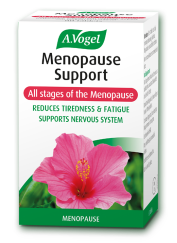Read the full video transcript below
Today's topic
Hello, and welcome to my weekly video blog. And today on A.Vogel Talks Menopause, I'm going to be discussing why menopause symptoms very often seem to get worse at night. Now, I'm afraid the main cause for this is lifestyle and living in the 21st century.
The menopause itself puts a huge energy drain and strain on our body, just as it is, never mind anything else. And if we then add in day-to-day stress, at some point, something basically has to give.
The generation gap!
Now, if you think about it in our mum's generations and our grandmother generations, life was probably a lot simpler then. They probably didn't go out to work, so they wouldn't have all this rushing about and trying to fit everything into the day.
They would have had a much more simple diet, a lot less sugar, probably very little caffeine, and I'm sure probably no alcohol at all. So it was much easier for their bodies to adapt to the changing hormones as they were going through the menopause.
Modern menopause
Today, well, you know, as women what do we do? We're multi-tasking practically from the moment we get up till the moment we go to bed. We got to get ourselves ready for work if we work. We have to go out to work. We have to deal with everything in the big wide world. We're probably still looking after family, we might even have children still at home.
All of this stress, and worry, and anxiety, can have a huge impact on our body energy levels. And by the time we've gone through the whole day in this state, then the body's ability to cope just collapses.
When that happens, it's like the floodgates are opened and that's when symptoms can either appear or the ones that you were experiencing during the day can often get worse.
What can you do to help yourself
So, what can you do about this? It's a really difficult one. We can't all just upstakes and disappear, although I did read in a book that the author had said that, all menopausal women should go away and find themselves for a year. And I thought that would be absolutely perfect. But we can't do that.
So it's all about being aware of what you're doing during the day or being mindful of what you're doing and what you're eating, and all the other things that are going on in your life. So, let's have a look at them.
Water, water, water
Those of you who have been watching for a while will know the first one, it's water. Really, really important. And I can't stress this enough and I will keep stressing it. The problem in the menopause is that...or before the menopause, oestrogen has the ability to keep water in the body. Oestrogen is very good for keeping your body hydrated generally.
When your oestrogen levels fall, your body's ability to hold on to water decreases, and that's before you end up with any of the symptoms such as hot flushes or sweats. So, if you've not been drinking a lot of water before the menopause, you then lose that extra ability to hold on to water, you're going to get extra dehydrated. And even if you were drinking a lot of water, when all these changes occur, you're going to need to add in that little bit more.
And water is one of the things that keeps our joints healthy, it keeps our brain ticking over. It keeps our skin nice and soft, and it helps to keep our energy levels up as well. So, remember, remember the water at all times.
Curb the caffeine
We need to look at caffeine as well. And the problem here is that if you're drinking in a cup of coffee, it takes the liver approximately 8 hours to process the caffeine. So, if you are having a cup of coffee with your lunch at 12:00, then your liver will be really stressed even by 8:00 at night, and that can have a huge effect on your energy levels.
So that mid-morning or early afternoon cup of coffee can actually be the cause of some of your early evening symptoms getting worse.
Keep your blood sugar levels stable
You need to look at your blood sugar levels. These need to be kept nicely balanced. Otherwise, you're likely to get things like panic attacks, anxiety attacks, and palpitations. So make sure that you're eating little and often, and obviously, try and really keep off sugary things because they are going to make everything worse, and they are a real drain on your energy.
Breathe deeply
Remember the breathing. It's so important, and I don't mean that in a funny way. But how we breathe affects our energy levels. And by night time, if we've not been breathing particularly well, our cells in the body are going to be practically oxygen-starved. They're not going to be able to cope with what they're supposed to do properly, and that can have a huge effect on your energy levels as well.
If you go on to Google, you'll find loads of places where they can show you how to do breathing exercises or look on YouTube as well.
Make time to relax
If you're always on the go, this can really drain your energy and this could be a big factor on what's happening in the nighttime, and it's amazing how often I say to women, "Relax. Do a little bit of relaxation. Take time out." And they go, "I can't. I can't. I've got too much to do."
But in the end, they're getting so fatigued and their symptoms are getting worse to the point where they may not be able to cope with the day-to-day things that they have been used to.
So that little half-hour of relaxation during the day, or shutting yourself away, or shutting yourself off is worth its weight in gold in helping your body to cope with all the symptoms that are coming along.
Little reminders help
So, you can see, these are all really simple things that you can add in to your daily life. But I know how difficult it is. You know, I'm very much the same. I find for me that if I'm really busy, I tend to not breathe particularly deeply, or if I'm really engrossed in something, sometimes it feels like I stopped breathing.
So when I'm at work, I actually have a little sticker on my computer, which says, ‘Breathe’ on it. And that's to remind me to take lovely, good deep breaths every now and again.
So, that's something you can do if you find you're not drinking enough water. If you're not relaxing, you know, stick a big relaxation sign on the microwave to remind you that you've got to have some little relaxation at night after you've maybe cooked the diner or tidied up the kitchen.
And if you find that you're forgetting to eat or you're maybe eating the wrong things, again, a little sticker on the fridge just to say, "Eat well."
And these things can be a lovely reminder of helping us just to cope during the day. And you may be really surprised at how quickly you're evening symptoms will improve if you put these things into practice.
Try these for yourself
So try it for a week, try all these for a week, and do let me know how you get on and I will look forward to seeing you next week for A.Vogel Talks Menopause.










